|
|
|
Sort Order |
|
|
|
Items / Page
|
|
|
|
|
|
|
| Srl | Item |
| 1 |
ID:
139669
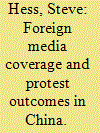

|
|
|
|
|
| Summary/Abstract |
By looking at the case of the 2011 Wukan rebellion in Guangdong Province, the following article explores the role played by foreign media in influencing the protest’s ultimate outcome: an intervention from above by provincial authorities in favour of the villagers. Placing Wukan into a four-level model incorporating local, provincial, national, and international dimensions, this article considers howWukan might serve as a model for contention that may influence future acts of popular protest in China in the digital age. It suggests that while appealing directly to foreign media can help claimants increase their leverage over local officials and prompt interventions from above, such actions are likely to modify and accelerate, but not fundamentally transform, existing patterns of localized, community-specific acts of contention seen earlier in the Reform Era.
|
|
|
|
|
|
|
|
|
|
|
|
|
|
|
|
| 2 |
ID:
139670
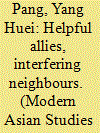

|
|
|
|
|
| Summary/Abstract |
In the aftermath of the Korean War, the People’s Republic of China was effectively an international pariah. Accounts of this period in Chinese textbooks emphasize how the Chinese turned this around, either during the Geneva Conference or the Bandung Conference, through deft planning and enterprise. Yet few pay any attention to how such manipulation of world opinion became increasingly difficult for Beijing after that initial success. One outcome of
China’s public relations campaign meant friendly Afro-Asia leaders voiced their opinions, in alarming numbers, to their Chinese counterparts regarding issues such as Asian security,mainland China’s economic development, and the Taiwan problem. Indeed, recently declassifiedChinese Foreign Affairs archive documents demonstrate that China tried to marshal such non-Soviet bloc opinions to its advantage during the first Taiwan Strait crisis (1955). Chinese efforts were successful in that there was no lack of volunteers to air dissent with American foreign policy. But these new allies also wished to mediate between the United
States and the Republic of China, on the one side, and mainland China on the other. Moreover, such efforts were often at variance with China’s domestic and strategic outlook in the region. China thus had to embark upon an active ‘management’ of disparate world opinions, which was an entirely new endeavour. Although China tried to provide a sanitized ‘script’ for its new friends, most had their own ideas. By the time of the second Taiwan Strait crisis (1958), the
volume of third party interference had grown.Overwhelmed by such international attention, China responded by openly rejecting unwelcomemediation efforts and demanded outright condemnation of the United States. Thus, ironically, with its growing prominence on the international stage, China found itself unbearably weighted down by the burden of world opinion, a position previously occupied by the United States.
|
|
|
|
|
|
|
|
|
|
|
|
|
|
|
|
| 3 |
ID:
139667


|
|
|
|
|
| Summary/Abstract |
More than 800 years ago—at approximately the same time as the founding of the first European universities—the renowned monastic institution known as the Nālandā Mahāvihāra disappeared from historical records. Since 2006, a transnational Asian initiative to revive ancient Nalanda as ‘Nalanda University’ in Bihar, India, has been embraced at the highest government and philanthropic levels by a consortium of South, Southeast, and East Asian nations. Nalanda, described as an ‘icon of Asian renaissance’, and the issues surrounding its revival raise important questions about how a new interest in ‘pan-Indo-Asianism’ and a newly imagined vision of ‘Asian’ education are seen as converging to promote Asian interests. First, I consider the ambivalent relationship of the revival and its pre-modern namesake against the Nālandā Mahāvihāra's known history. Then I characterize two kinds of discourse on the contemporary project: one that is ‘pan-Indo-Asian’ and frames the revival as serving transnational Asian goals; and another that is Indic and imagines Nalanda as advancing Indian national concerns. While, for the various stakeholders, serious fissures are evident in the symbolic values of Nalanda—as an exemplar of Asia and of India—both types of discourse, taken together, reveal important insights into the development of an alternative model of education that is both modern and ‘Asian’.
|
|
|
|
|
|
|
|
|
|
|
|
|
|
|
|
| 4 |
ID:
139665
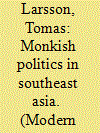

|
|
|
|
|
| Summary/Abstract |
In the Theravāda Buddhist polities on the mainland of Southeast Asia, abiding concerns about the proper structuring of the relationship between the ‘two wheels of dhamma’ (i.e. the realm of religion and the realm of politics) have had a profound influence on processes of state formation and political legitimation. This article explores one such religious ‘effect’ on the constitutions and electoral laws of modern Burma/Myanmar, Siam/Thailand, Cambodia, and Laos, namely the official disenfranchisement of Buddhist monks (and, in some instances, Buddhist ‘nuns’ as well as non-Buddhist clergy). The article traces the historical evolution of this Buddhist exception to the democratic principle of equal and universal suffrage, and assesses the extent to which dominant theoretical approaches in the social sciences help us to understand the politics of religious disenfranchisement in Southeast Asia. It finds that neither secularization theory nor the religious-economy approach can explain observed patterns. Instead, the article offers an account of the politics of religious disenfranchisement that emphasizes the role of ideas and historical context.
|
|
|
|
|
|
|
|
|
|
|
|
|
|
|
|
| 5 |
ID:
139666
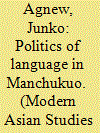

|
|
|
|
|
| Summary/Abstract |
This article explores the language politics of Manchukuo and the implications reflected in the literary texts of the Japanese writer Hinata Nobuo and the Chinese writer Gu Ding. Through the close examination of communicative failures, such as lexical misunderstandings, linguistic barriers, lies, and rumours in Hinata Nobuo's ‘The Eighth Switching Point’ and Gu Ding's ‘The Wilds’, this article illustrates the authors’ different responses to the impact of this language politics. While both authors were aware of the mutable nature of language, Hinata perceived the Japanese language as a symbol of colonial power and thus the miscommunications between Japanese and Chinese in his story address the ethnic hierarchy embedded in language in the specific context of Manchukuo. Gu Ding, on the other hand, did not see language as a defining element of the culture of a nation, and therefore tried to construct a new type of language and community that were not restricted by the discursive notions of the Chinese and Japanese nations. Gu Ding's primary concern was the modernization of his native place and, to him, adherence to traditional language forms was insignificant and deleterious.
|
|
|
|
|
|
|
|
|
|
|
|
|
|
|
|
| 6 |
ID:
139664


|
|
|
|
|
| Summary/Abstract |
India and federalizing Nepal represent distinct types of federal polity: their origins lie not in the unification of previously autonomous states, but in the devolution of power by a previously centralized state. The boundaries of their constituent sub-units are therefore open to debate, and settling their contours is central to the project of state-building. Written by a political scientist and an anthropologist, this paper presents a comparative exploration of the reciprocal relationship between state structuring and ethnicity in India and Nepal, with a focus on the effects of territorial versus non-territorial forms of recognition. It pushes against recent tendencies within South Asian Studies to see ethnic identity as called into being solely by state practices or ‘governmentality’ on the one hand, or as a newly commoditized form of belonging produced through neoliberal reforms on the other. Instead it argues that ethnicity must be understood as a multivalent concept that is at once embedded in specific histories of state and sub-state formation, and generative of them. Comparative in scope yet driven by qualitative data collected over years of engagement across the region, the paper charts a middle way between detailed ethnographic studies and large-scale comparative endeavours.
|
|
|
|
|
|
|
|
|
|
|
|
|
|
|
|
| 7 |
ID:
139668
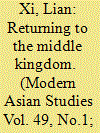

|
|
|
|
|
| Summary/Abstract |
This article re-examines the frustrated Westernizing efforts of Yung Wing and the recalled students of the Chinese Educational Mission to the United States (1872–1881). It does so in response to recent scholarship (in both the Chinese and the English languages) which affirms the ‘transformative role’ of the returnees in late Qing reform and modernization. On the basis of a variety of sources, this article suggests, instead, that for those patriotic students returning to the Middle Kingdom, eager to bring about a fundamental change in its political system and rejuvenation of its civilization, disillusionment was often inevitable, and the choice—short of revolution—became one of either marginalization or co-option by the autocratic state. Despite all their achievements, China’s earliest students of the West ultimately failed to set the country upon a new modernizing course—a failure that pointed, beyond itself, to an emerging (and subsequently persistent) pattern in the troubled relationship between the new, Westernized elite and the state in modern China.
|
|
|
|
|
|
|
|
|
|
|
|
|
|
|
|
|
|
|
|
|